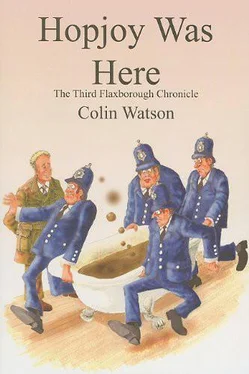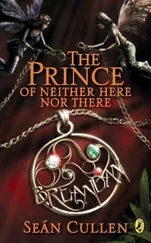Tools, most of which looked long disused, lay neatly on a workbench supported by brackets at the end of the garage. There were several tins of oil and polish and paint on the shelf above the bench; among the miscellany stacked below it Purbright noticed the incongruous presence of playroom relics—a bagatelle board, a tied bundle of toy rails, a battered magic lantern.
He looked up from these to see Warlock stooped in one of his now familiar sinuous postures and to hear: “This household certainly seems well stocked with hammers. One for each job.”
Purbright peered over Warlock’s shoulder. Lying in shadow along a wall beam about a foot from the floor was a hammer almost identical with the one found in the bathroom. Warlock pointed to faintly glistening fragments on its head. “This is what must have been used to bust up the carboy, squire.” He turned upon the inspector a look compounded of satisfaction and expectancy; Purbright, surfeited with clues for one day, had the odd fancy that if he grasped and threw the hammer Warlock would leap, snap unerringly upon it in mid air, and with canine idiocy lay it again before him.
“Looks like it,” Purbright said, flatly.
Warlock whipped out a very clean handkerchief and picked up the hammer by the end of its haft. Holding it suspended before him, he slowly stood up and regarded it, frowning.
“I wonder why he didn’t bring the other one down and use that. I’d have thought it was a pretty natural thing to do.”
“Squeamishness?” suggested Purbright.
“On his showing up to now you could hardly put him down as a sensitive type. Another thing—why should he have left these things about, anyway? He went to the trouble of smashing the carboy and burying it. Me, I’d have chucked the hammer in as well. Every time.”
Purbright smiled, a little wearily. “Murdering people, Mr Warlock, must be a somewhat distracting business. Even the most conscientious practitioner probably tends to overlook things,”
As they re-entered the kitchen, there came from somewhere outside the house a short cooing call, soon afterwards repeated. The inspector went to the window and looked out.
Boggan, one foot on his spade, was turned towards the right-hand fence. A woman, apparently standing on something on her side of it, beckoned him eagerly. Boggan strolled across the lawn and listened to what she had to say. She was, Purbright noticed, an elderly woman, but rosy-faced and alert. For as long as she was talking she tilted back her head and kept her eyes tight shut, while her hand occasionally sought to discipline a stray wisp of her almost white hair.
Boggan sought the inspector.
“It’s Mrs Sayers next door, sir. She’d like a word with you. She says she can tell you about Mr Periam.”
Chapter Three
Mrs Alice Sayers celebrated the installation of a police inspector in her drawing-room by serving a jug of hot milk and water mixture delicately tinctured with coffee essence, switching on an electric fire that produced a cinematic representation of flames and a terrible smell of singeing fluff, and unshrouding the cage of a budgerigar called Trevor.
Also offered was a plate of slightly soft wheatmeal biscuits.
Purbright sat in a massive but unyielding armchair and watched Mrs Sayers administer fragments of biscuit to Trevor. This she did with a pout and a curious chuffling, sucking noise that was apparently intended to whet the bird’s appetite.
At intervals she turned her head and with closed eyes addressed herself to the second most important creature in the room.
“I do hope you’ll not think I’m just being terribly inquisitive, inspector, but I’m really very fond of Gordon and of course I didn’t know what to think when I saw policemen all over the place. Well, people do fear the worst when it comes to digging , don’t they?”
Her eyes opened and stayed watchful while she smiled, waiting to see how much she would be told.
“There’s no need to let that alarm you, Mrs Sayers. All we know at the moment is that the two gentlemen next door appear to be...unaccounted for. There may be a perfectly simple explanation, but so long as there’s the possibility of something being wrong we shall have to cast around a bit.”
Trevor, neglected, emitted a stream of staccato squawking that sounded like enamel being chiselled off a saucepan bottom. Purbright shivered. Mrs Sayers lovingly tapped the bars of the cage with her fingernail and reached for another biscuit.
“What you mean, I suppose, is that Gordon’s missing? But how extraordinary. Couldn’t he be on holiday, or something?”
“That is what we should very much like to know. When I received your message, I was hopeful that you might be able to tell us something definite.”
“Oh, naturally I shall do all I can to help, inspector. Mrs Periam was a very dear friend of mine. And Gordon was a crutch to her; I can’t think of any other word. I wonder...” She paused. “Have you by any chance had a word with Mrs Wilson? She’s next to the Periams on the other side.”
“We did make some enquiries there. She wasn’t able to tell us much.”
Mrs Sayers gave a quick satisfied nod. “No, Mrs Wilson keeps pretty well to herself.” She thought again. “Then there’s Mrs Cork and her Miriam. They overlook at the back, you know. Have you tried them?”
“We shall bear them in mind,” Purbright said, patiently. Trevor hooted and began to peck at its perch in a sudden transport of paranoia. “Choodle scrmsh,” murmured Mrs Sayers.
“Mr Periam has lived in the house next door all his life, I take it.”
“Oh, yes; he was born there. I remember how relieved we all were. She’d had a terrible time with him. Dr Peters wouldn’t let her stir for the last four months. She lived on arrowroot and tonic wine and a woman called Dursnip or something like that used to call every Tuesday and Friday to massage the water up out of her legs. Of course, having babies nowadays is a dreadfully off-hand business, isn’t it?”
“Relatively so,” confirmed Purbright.
“And yet she used to say to me that Gordon had made up for all she’d gone through and more besides. Every time he did some little thing for her she’d say that was another jewel God would put in his crown. She was a bit religious, you know. Well, I think it helped her when she lost her husband. Mastoid. Gordon wore a scarf every time he went out, winter and summer, right up to being nineteen or twenty. She was afraid it might have been passed on, but I think you can make too much of these things don’t you?”
“Mr Periam wa...isn’t married?”
Mrs Sayers pouted and drew in a quick breath of denial.
“Girl friends?”
Mrs Sayers considered. “There is a young lady who calls sometimes. I’d always supposed she belonged to the other one—Mr Hopjoy, you know; I think he’s more that sort. But I wouldn’t swear to it. Gordon’s losing his mother might have made a difference.”
“Was Mr Periam on good terms with Mr Hopjoy? You’ve never heard them fall out with each other?”
“No, I haven’t. Gordon has a sunny nature, though; I’m sure he’d get on with anyone. I’d call him staunch, too. Mind, between ourselves, the lodger’s a bit of a fly-by-night. It says a lot for Gordon that he’s let him stay on. I think it’s because he feels his mother would have expected him to.”
“Mrs Periam thought well of Mr Hopjoy, then?”
Mrs Sayers gave the sort of smile with which one forgives the follies of the dead. “She saw only the good in everyone.”
Trevor, now tramping rhythmically on its perch, cackled derisively. Mrs Sayers held up a finger, inviting Purbright’s attention to the oracle. “Get me serviette, mother; get me serviette, mother,” she translated. “Well, I never,” said the inspector.
Читать дальше

![Fredrik Backman - Britt-Marie Was Here [Britt-Marie var här]](/books/61260/fredrik-backman-britt-marie-was-here-britt-thumb.webp)










